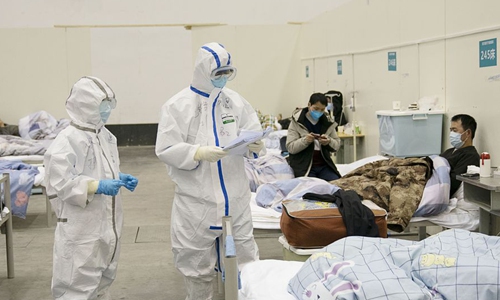HOME >> OPINION
Elections, partisan politics stymie epidemic control in US
By Li Haidong Source:Global Times Published: 2020/2/28 1:15:19

Medical staff check a patient's condition at a temporary hospital converted from "Wuhan Livingroom" in Wuhan, central China's Hubei Province, Feb. 10, 2020. (Xinhua/Xiong Qi)
The novel coronavirus pneumonia (COVID-19) epidemic will almost certainly spread in the US amid its outbreak across the globe, so it should be a concern to what extent the epidemic would impact the US.
However, at such a crucial time of battling the virus, the US has once again showed the world its domestic politics and governance is in a mess, which would lead the country to an unbearable consequence.
Officials of US Centers for Disease Control and Prevention (CDC) warned Americans on Tuesday to begin preparing for the epidemic as it is "an unprecedented, potentially severe health challenge globally." However, US President Donald Trump said on Tuesday that the COVID-19 "is very well under control" in the US and that "there are very few people with it" in the US who "are all getting better."
The totally different attitude between the US president and his health officials may lie in two aspects. First, as the presidential elections draw near, Trump wants to bring good news to his voters and countries he regards as allies and partners, so as to increase people's and those countries' confidence in his governing capacity. Second, Trump may not know enough of the severity of the COVID-19 and he hasn't thought about it seriously.
The US reported 59 cases on Wednesday. Nonetheless, the communities that could be influenced due to those confirmed cases would cover a much greater number of residents. The US is possibly still in an incubation period of the virus.
US health officials should have a clearer idea of how the situation is in the country, but although they have warned about the outbreak, it is not them but their president who will make the final call on how to respond. But Trump's political considerations and his lack of knowledge may throw his administration into hot water in the subsequent response to the epidemic.
If Trump continues downplaying the COVID-19, he could have his campaign blasted, which he doesn't want to see. But if he cannot properly take in his health officials warnings, he may have to eat the bitter fruit made by himself.
Given the current epidemic prevention and control measures, the US federal government has done poorly. The White House on Monday asked US Congress for $25 billion to fund its response to the COVID-19, which reflected federal government's previously severe lack of funding in this aspect. Nita M. Lowey, the chairwoman of the House Appropriations Committee, said the request is "woefully insufficient to protect Americans from the deadly coronavirus outbreak" and is "to raid money Congress has designated for other critical public health priorities," the New York Times reported.
The congresswoman's statement on one hand showed the federal government's indifferent attitude toward the COVID-19. On the other, it reflected that US congressmen and congresswomen consider more the voters from their own electoral districts and make judgments based on that. In other words, US politicians care more about their individual, limited interests rather than the overall interests of their country when trying to figure a way out for something of big concern.
Due to the principle of US political structure, which is decentralization and balance of power, different departments and agencies of the federal government argue back and forth on many issues, leading to a delay in a solution if a consensus cannot be reached.
But the outbreak won't wait that long. Hence, some US states have already taken local measures to safeguard their own interests. But such uncoordinated responses between federal and local governments would make the states that are still waiting for federal orders vulnerable to the epidemic.
The White House's request for emergency funding comes as it proposes to cut health programs across the government. Making decisions back and forth, the Trump administration has created confusion among ordinary American people and even many congresspersons. And this would further hinder different bodies under US political structure from developing common ground in battling the COVID-19.
Given the combined effect of the above-mentioned factors, once the epidemic breaks out in the US, its consequences could possibly be more severe than those China has endured.
The author is a professor with the Institute of International Relations, China Foreign Affairs University. opinion@globaltimes.com.cn
Posted in: VIEWPOINT